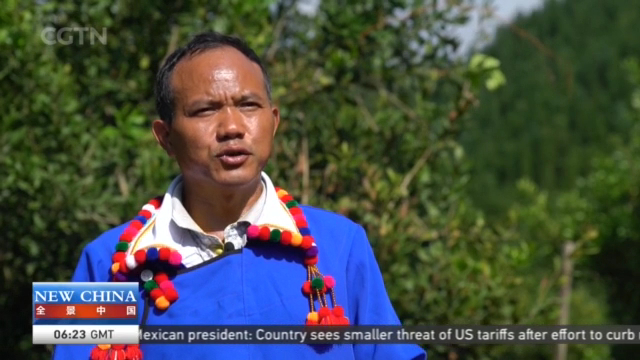
15:18, 12-Sep-2019
Celebrating 70 Years of New China: China's ethnic groups undergo leapfrog development
Updated
15:34, 12-Sep-2019

For this edition, we begin in Dali of southwest China's Yunnan Province. It's home to the largest population of the country's Bai ethnic minority. Over the past 7 decades, like the nation's other 54 ethnic minority groups, the Bai people have undergone radical changes in many aspects of their lives. CGTN reporter Yang Jinghao looks at how China has worked towards equal development among its ethnic groups.
Like his fellow villagers, Yang Lawan is busy harvesting macadamia nuts this season. On a map, they even can't identify where the nuts come from, but with the help of local government, the exotic food is creating handsome profits for this small town in southwestern Yunnan Province, the major habitat for De'ang ethnic group which has a very small population.
YANG LAWAN RESIDENT OF DE'ANG ETHNIC MINORITY "We used to grow crops like rice and corn, which had limited economic benefits. They could barely support our living. After bringing in macadamia nuts, now we can make more money for other uses."
Benefiting from the nation's poverty alleviation drive and preferential policies towards ethnic minorities, the town has undergone great changes.
YANG LAWAN RESIDENT OF DE'ANG ETHNIC MINORITY "Take our infrastructure for example, the roads were unpaved and rugged when I was a child, but now, you can see all are concrete roads."
The changes for De'ang people are an example of the development of China's 55 ethnic minorities over the past seven decades. For quite a few years, most of the ethnic groups lived in a primitive way in isolated areas. There were even pervasive oppressions and exploitations. Since the founding of New China in 1949, everything started to change. The priority was promoting equality with diverse measures.
HE MING PROFESSOR OF ETHNOLOGY, YUNNAN UNIVERSITY "Institutionally, each ethnic group was guaranteed with certain seats in the country's top legislature and political advisory body. And the country implemented the ethnic autonomy system in some regions to make sure the natives be the masters of their own affairs. These measures properly solved the discrimination issue in history."
Based on this, the central government has been promoting solidarity among different groups. Professor HE says this is vital to the development of each group and the country as a whole.
YANG JINGHAO DALI CITY "I'm here in a village in Dali city. There are only about 500 residents here, but they belong to seven different ethnic groups."
Wang Pinzhen was born into a local traditional Bai family. His son-in-law and daughter-in-law are from Han and Yi groups respectively. He has witnessed how the integration of different ethnic cultures has impacted the remote village.
WANG PINZHEN DALI RESIDENT "Though the villagers are from different groups, it seems we are from the same origin and live like a big family. Harmony is very important for even a single family."
Experts say, as the quality of life of all ethnic minorities continues to improve, the protection and inheritance of their unique culture is also paramount. YJH, CGTN, Yunnan Province.
SITEMAP
Copyright © 2018 CGTN. Beijing ICP prepared NO.16065310-3
Copyright © 2018 CGTN. Beijing ICP prepared NO.16065310-3